Essential Information on SRD SASSA Social Relief of Distress Grant
The SRD R350 / R370 Grant, also known as Social Relief of Distress (SRD) Grant, was started by the South African government in April 2022. This grant was introduced to support individuals affected by the COVID-19 pandemic. The primary goal of the SRD SASSA Grant is to provide help to those who lost their jobs and are facing financial problems.
This grant is carried out by the South African Social Security Agency (SASSA). It falls under the purview of section 32 of the Social Assistance Act of 2004 and is carried out according to the Finance Ministry. In his 2025 Budget Speech, Finance Minister Enoch Godongwana announced that the grant will remain at R370 per month and has been extended for another year, up to March 2026. It gives a monthly payment of R370 to those that are not obtaining any other kind of government grant, including social grants or unemployment insurance.
In this article, you will find every detail about this grant, including common problems applicants often face. If you are applying or have already applied for this grant, this article will provide answers to all your queries. If you have more questions, feel free to comment below, and I’ll do my best to give you accurate information.
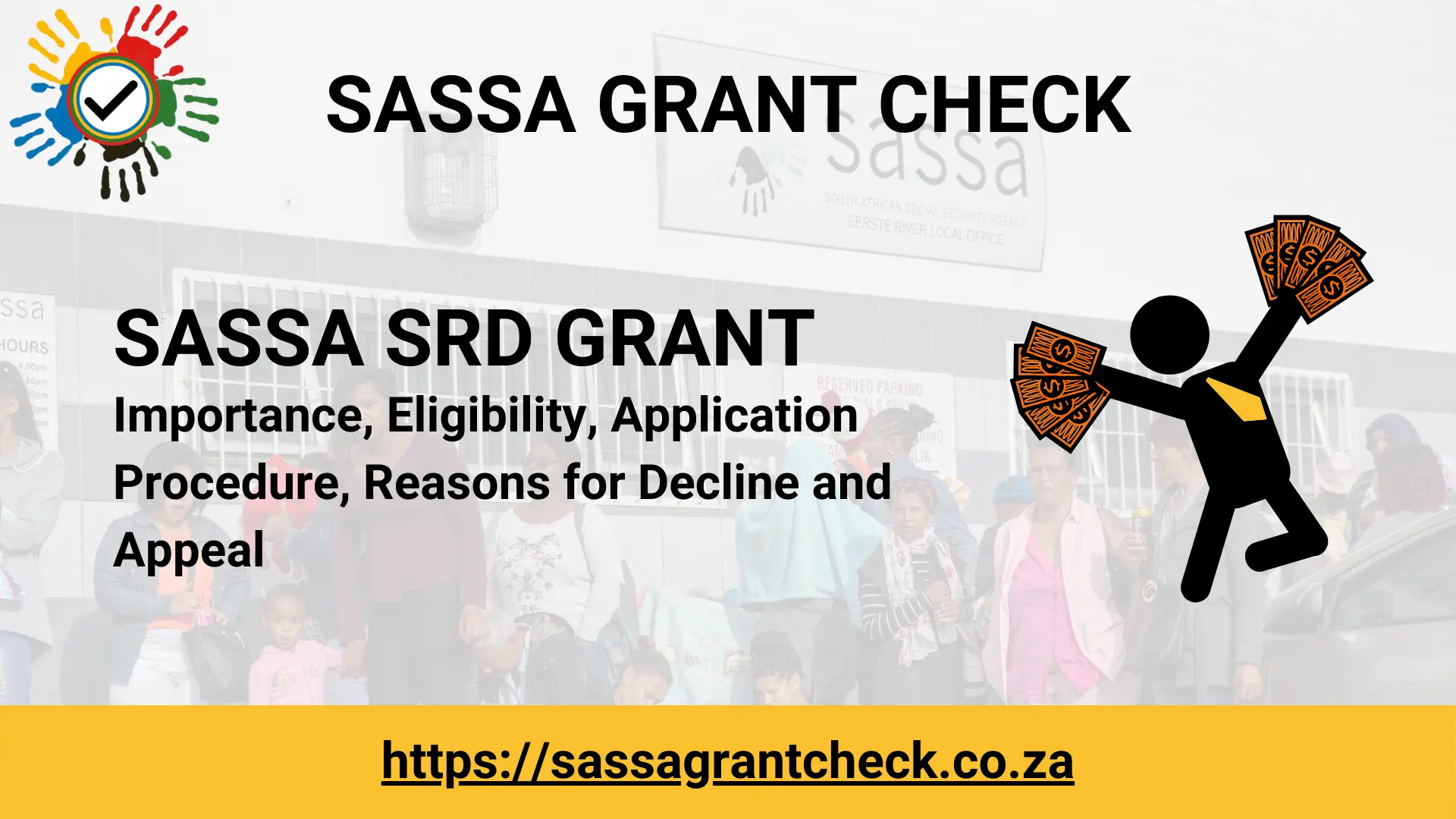
Importance of Social Relief of Distress Grant
This SASSA grant holds a critical role in addressing the needs of South Africans, particularly in the wake of the COVID-19 pandemic and the ongoing high poverty rates.
According to Statista, total populace of South Africa in 2022 was 60.6 million. Among them, 57.6% (34.9 million) fall within the age group of 18-59 years, making them eligible for this grant. To break it down additionally, an estimated 18.3 million individuals reside in extreme hardship in South Africa, and 13.4 million have no income. This high hardship and unemployment rate highlight the dire demand for social assistance programs similar to this aid.
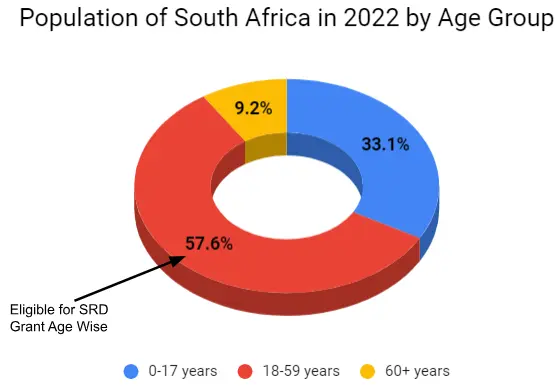
According to SoNA, 2 million individuals lost their jobs due to Covid-19 pandemic, getting worse the hardship circumstance. SoNA numbers in 2025 expose that greater than 28 million people count on social gives in the nation. Around 9 million out of work people are presently taking advantage of this social grant alone.
The Special COVID-19 grant provides a monthly income for those who struggle to meet basic needs like food. According to the Final Special COVID19 SRD Grant Report, 93.3% of the surveyed applicants reported using the grant to buy basic food.
This grant provides immediate economic and social relief to beneficiaries. It helps vulnerable individuals facing hardship and unemployment regain some dignity. Given the high poverty rate and the 9 million people relying on this grant to meet basic needs, its importance in South Africa is undeniable.
Eligibility Criteria to Qualify for SRD SASSA Grant
SASSA has set up a tight eligibility criteria so that this grant reaches to most deserving applicants. You must fulfill the following requirements to get this grant;
Required Documents to Apply for this Grant
You don’t need to scan or upload any documents to apply for SRD SASSA R370 grant. Simply collect your basic info and fill in the application online. Make certain your information is correct according to your papers. SASSA will certainly verify this details by their very own ways. Especially, your contact number should be the one that is reachable, as SASSA will contact you using this number.
Before you start your application, SASSA will ask you to agree to their Consent and Declaration form. You must agree to this to continue. Once you accept the terms and conditions, you can proceed with your application.
Application Procedure for COVID-19 Social Grant
Applying for the COVID-19 Social Relief of Distress Grant is simple and can be done in several ways. Follow these steps to apply for this grant using SASSA’s official site, srd sassa gov za:
That’s it! You will receive a confirmation message on your provided number indicating that your grant is now active.
Others Methods to Apply
If you need detailed information on how to apply for this grant by other methods. You can read my detailed guide on SASSA Online Application.
How to Check the Status of Your Application?
After you submit your SRD SASSA grant application, you need to track its status to find result of your application. SASSA takes 2-3 months to verify your application. Once they complete the verification process, they will update your application status as approved or declined. You can do SASSA Status check of your application by using many methods as listed below;
Using Moya application on your smart phone (without internet)
By sending an SMS on SASSA number
(082) 046 8553
Contacting SASSA on their WhatsApp number
(082) 046 8553
By calling on SASSA toll free number
0800 60 10 11
Reasons for SASSA COVID-19 Grant Declined
SASSA checks your information every month. If your details change and you no longer qualify, your grant can be declined for that month. Here are some reasons why your social Grant application might be declined:
Understanding these reasons can help you avoid common mistakes and improve your chances of approval.
Methods to Apply for Reconsideration
If you believe your social relief of distress application was wrongly declined, you can ask for a reconsideration. Your application is verified each month for the approval of grant. Each month, SASSA verifies your application for the grant. If declined, you need to apply for reconsideration separately for each month within 30 days of the rejection. You can apply for reconsideration using three alternative ways.
- Official website
- In person Application
- Call on Toll-free number and request reconsideration
Appeal Against the Declined Social Grant
If your R350 / R370 grant reconsideration is also declined and you still believe this decision was incorrect, you can still challenge the decision. You need to file an appeal against this decision with the Independent Tribunal for Social Assistance Appeals (ITSAA) within 90 days of receiving the rejection notice. Before starting the appeal procedure make sure you understand the reason provided by SASSA for declining your application. This information is crucial for preparing your appeal. SASSA will take 60 – 90 days to make the decision.
SRD Grant Cancellation
There can be several reasons why you might want to cancel your SRD SASSA. You may have found employment or another source of income, making you ineligible for the grant. Canceling your grant is both legally and ethically right, as it allows someone else in need to receive it. It also helps you avoid any legal issues with SASSA. Read my guide about how to cancel your SRD grant? Follow each step and your grant will be canceled within 7 days, and you will no longer be a beneficiary of this grant.
If after some time of canellation you again find yourself in need of it, you may be able to reinstate your COVID-19 social relief of distress grant. Reinstatement allows you to continue receiving financial assistance during difficult times. SASSA may decline your reinstatement request if your latest information does not meet the eligibility criteria of SRD R370 Grant.
Changing Bank Details for Receiving Payment
If you need to update your banking details for your SRD SASSA grant, there’s an easy method to do so. Many applicants worry that changing banking details is hard, but it’s actually straightforward. Just follow these steps:
You will receive a confirmation message on your mobile number once your banking details have been successfully changed. Your future grants will be deposited into your new account.
How to Update Name and Surname in SRD Application
There are two possible reasons why you might need to update your name and surname in your application:
- You made changes to your name and surname record with the Department of Home Affairs.
- You made a spelling mistake while entering your name and surname in the application.
Don’t worry! You can change these details in both cases. Follow these steps:
Note: Your Name and Surname will only be updated if your data matches with records available in the Department of Home Affairs database.
Is Amount of R370 Enough to Alleviate Poverty?
As a Social Worker, I discover myself pondering over the competence of this grant, especially in the aftermath of the COVID-19 pandemic. The grant, which has been a lifeline for several citizens, has been a subject of worry regarding its impact on destitution reduction. The decision to maintain the grant at R350 from 2020 to March 2023 has elevated brows, considering the economic obstacles encountered by susceptible populaces.
Recently, there has actually been a slight boost in this grant, with the cash being increased to R370 in April 2024. While any increase might seem beneficial, one cannot overlook the stark reality of rising costs. The cost of living has soared, making it increasingly difficult for individuals relying on the grant to make ends meet. This raises a fundamental question: Is R370 enough to alleviate poverty in our country?
A much deeper evaluation of the statistics reveals a worrying pattern. The National Poverty Lines, adjusted for inflation, have actually seen a significant increase with time, specifically in essential expenses such as food. When the social grant was first presented in 2020, the monthly food poverty limit was R585 each. By 2023, this number had actually jumped to R723, standing for a 23% surge. However, during this period, there was no corresponding increase in the grant amount until the recent adjustment in April 2024.
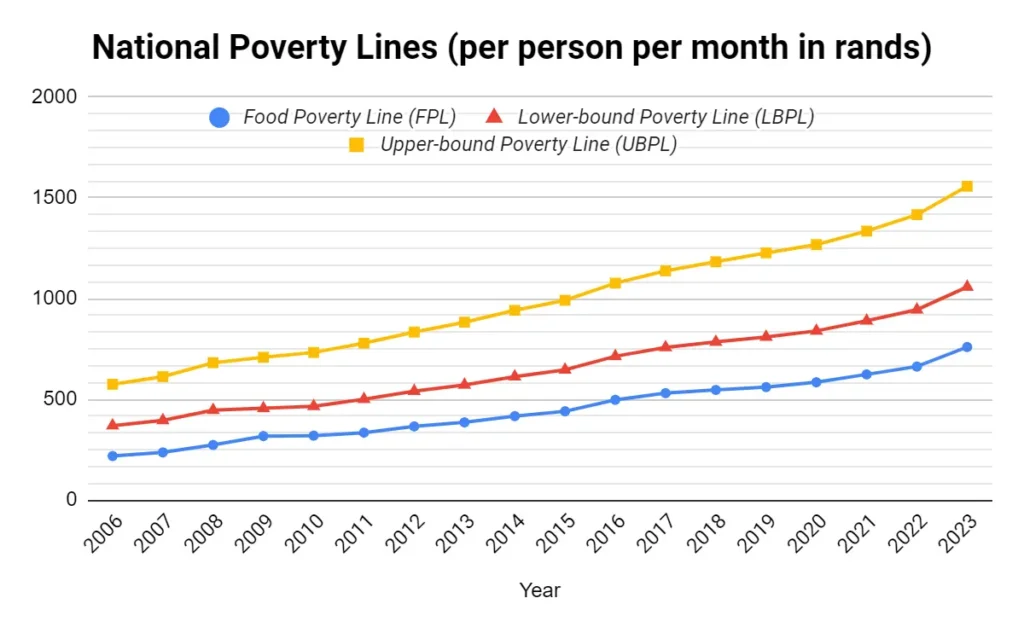
Source: https://www.statssa.gov.za/publications/P03101/P031012023.pdf
The recent increase of R20 in this grant, announced by Finance Minister Enoch Godongwana, represents a 5.4% increment. While any increase is welcomed, it falls short of addressing the widening gap between the grant and the actual cost of living. This gap is especially glaring for families with multiple dependents, who find it increasingly challenging to cover basic expenses with the current grant money.
In conclusion, the recent increase in the SRD grant, while a step in the right direction, may not be enough to lift individuals and families out of poverty. The widening gap between the grant amount and the rising cost of living necessitates a critical reevaluation of our social welfare policies to ensure they effectively address the financial challenges faced by the most vulnerable members of our society.
FAQs

Editor at SGC
Sifiso Andreas
Hi! I’m Sifiso Andreas, with a background as a Grant Administrator at SASSA, I bring firsthand experience and deep knowledge of social welfare programs in South Africa. My goal is to help you navigate the complexities of social grants, scholarships, and government assistance with up-to-date resources and expert guidance. Join me for the latest updates and essential information on SASSA grants.

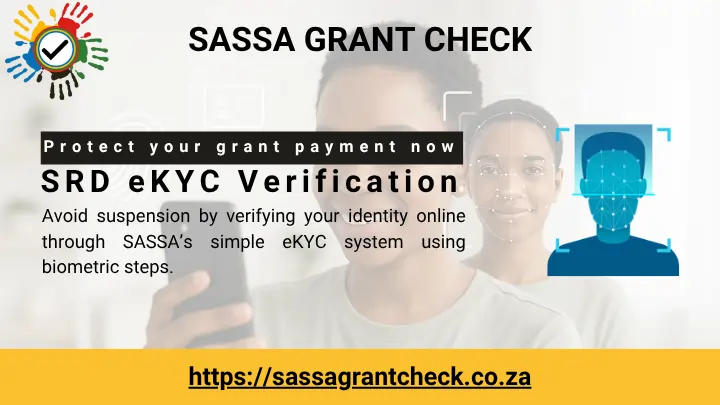
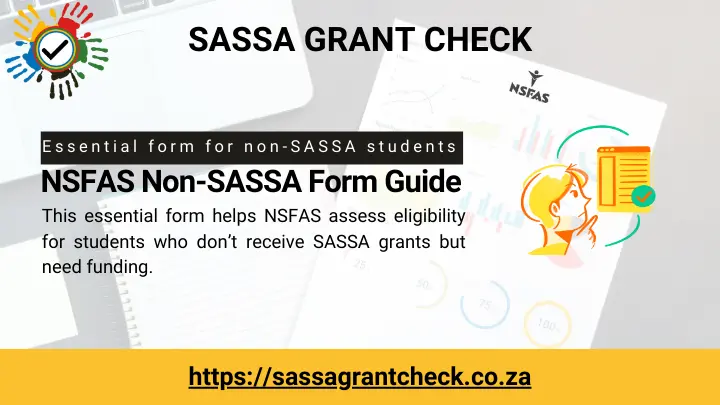
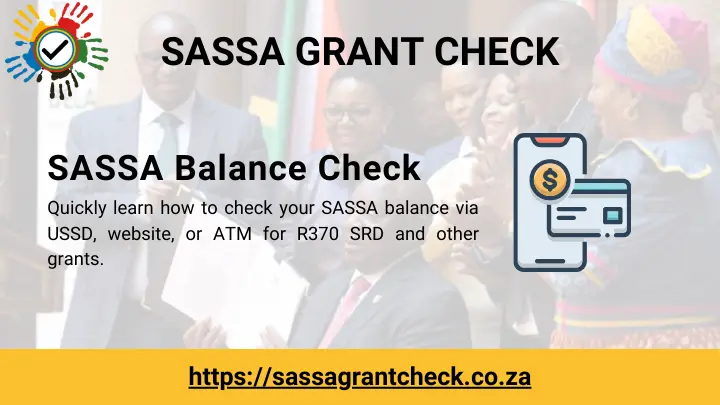
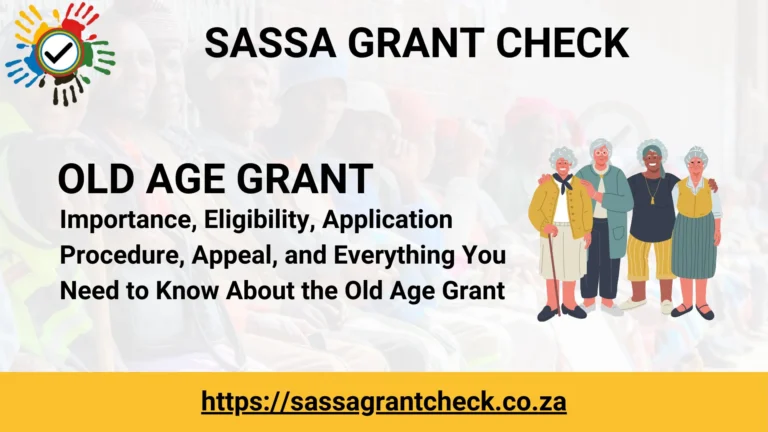
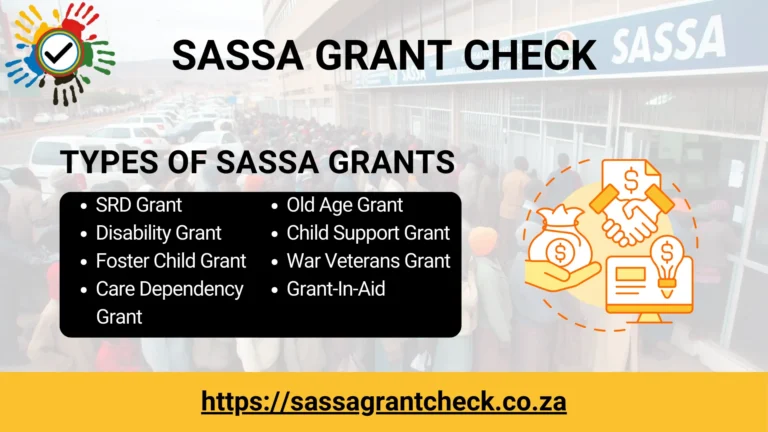
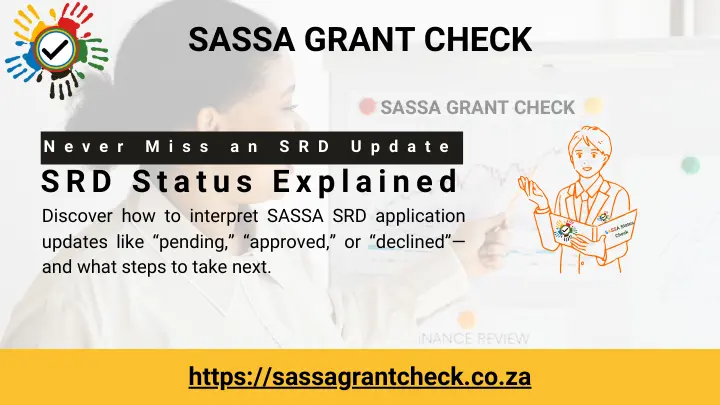
Dear Sassa please help me to finish my identity verification because I am not working I need my r370 I last to receive my r370 on may 2024 thank you
use this guide for verification
i am enquiring about changing my number phone
follow change phone number guide
I want to change number application
see change phone number guide
How can I change my number without registered ID because I don’t remember it….it was a friend’s number so I would like to change it to my own number please help I haven’t able to access my sassa 370 and is being years now N I really need it now
if you do not remember application id then only way is to contact sassa official helpline number or by visiting nearest office
Yes
I want toe change number
The complete procedure is outlined on the ‘Change Phone Number’ page.
Change my Number
follow change phone number guide
I want to Change Number
follow change phone number guide
Hi I want to change my number because I lost the phone so I want to use another on 370 grant
For all those who want to change number please see this guide
Zizaphuma nin ezika2018
Lost my simkaart
Kutheni zigaveli ezizika2018
Hi would like to help me change my number
Hi I lost my SIM card
I want to change my number because someone created it for herself
Got my sms but now I need 2know how do I update my details please
Hi
28187 ext 05 lebesi street mamelodi east
How to change cell number without otp code
They applied my srd without my permission
Yha
how can I change my phone number of my sassa,350
How change my phone number please help 6 digits aplication
Hi lost my cell phone and I use new number so I want to change the old to new one for my 350 grant
Did u manage to change your numbers coz I have same problem
I have been waiting for verification sms for almost 5 months now.
Hi my sasa For R370 is still paing I need this
I lost my phone number please I want change phone number for my 370
My sassa grand application
Hello i didn’t reserve my R370 grant this month is still pending. Can you help me
I’ve been appeal for my srd grant since November last year and the status still pending so what must i do
Good post and right to the point. I am not sure if this is in fact the best place to ask but do you folks have any thoughts on where to get some professional writers? Thanks in advance 🙂
I forget my 350 number
Check your R350 status using ID number and registered phone number. You will see your application ID for 350 grant written there.
Still pending
Applied April 2025 for R370 Grant…Status like this since Mid. May..
MAY2025 approved – –
APR2025 pending – – –
if you appealed for APR2025 then it can take upto 90days.
Mine is like that
I forgot my numbers
My sassa grand
I lost the number that I was using
What I do when I chenge my number
I want to change account details
I lost my registered number for sdr grant so I would like to change it without using application ID
Lost my number for 370
I lost my fone number last year on septmber 2024
you can get same number from your sim provider. or if you remember your application id then you can change your phone number.
I forgot srd number
I want to change numbers applications
Please see change phone number guide.